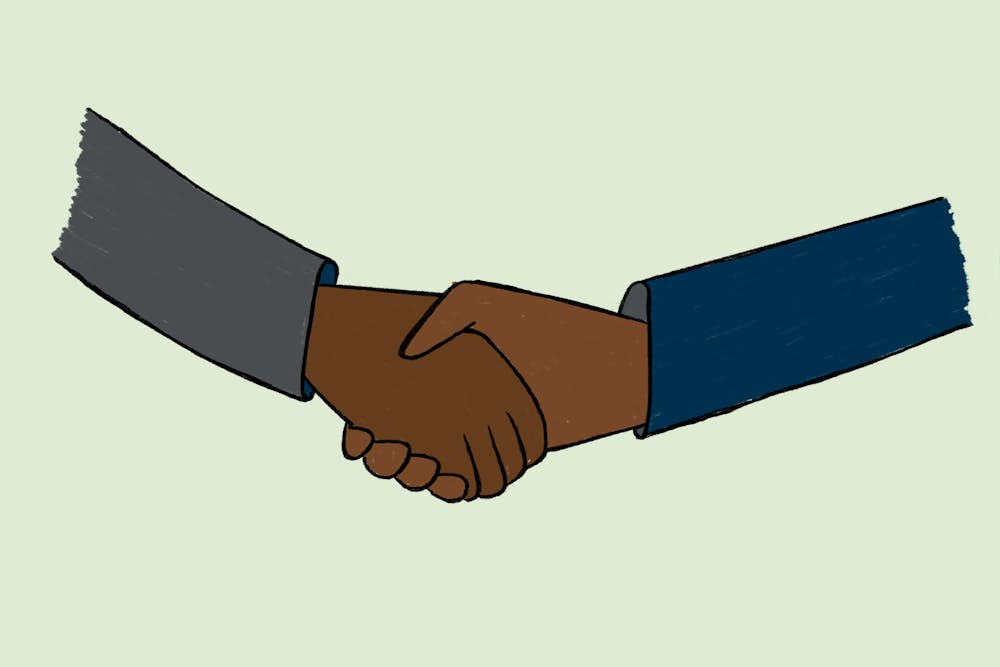For most college students, getting a satisfactory job out of college is a frequent thought, causing sleepless nights and constant anxiety. The chances of finding a job are hard to predict, especially early in your college career. Never mind getting a job at your dream company, in an ideal location, with sufficient pay. There are many factors your academic advisor will drone out to you: the current economy, company preference, market shortage or inflation, etc. As I discussed this with a friend last week in the Engineering College, she said the four words that every desperate job searcher hopes to say:
“Luckily, I know someone.”
I nodded solemnly, acknowledging the power of her claim. Later, I began to think, is “knowing someone” in your field a surefire way to secure an adequate job? If it is, are we really living in the land of opportunity, or is it just the land of old-school ties?
It's a tough question, but for the sake of time, let's face the blunt facts. Job qualifications, which were once counted as a solid means of getting hired, have seemingly gone fluid. Terms like “degree inflation” and Charlie Kirk's Twitter page terrorize college students nationwide with the threat that a degree is no longer enough to justify getting a good job.
Worse, companies can’t seem to land on any lasting hiring norms: with the Trump Administration back in power, big brands like Meta, Amazon and Target have reversed their once all-encompassing DEI hiring initiatives at the threat of legal action. Affirmative Action recruiting strategies have also come to a full stop after the Supreme Court reversed its decision in the summer of 2023, leaving students and professionals to find new hiring norms.
Additionally, many companies have established firm requirements for internship experience, but it becomes a circular issue when competitive internships, in turn, require previous experience. It’s hard to be sure what will get you in the door these days, or even where the door is.
However, a quick LinkedIn search will tell you that 70% of people were hired by companies where they knew someone. Furthermore, at more “desirable” or competitive companies, the number shot up to 95% of employees hired through connections.
To avoid sleepless nights worrying about a job, it seems like you need to know people. Obviously, that isn’t entirely enough — a good resume, strong interview skills, and an adaptive personality are the only things that can help you secure a dream career. From a purely pragmatic stance, the more people you know, the better.
Some people may leave it at that and move on, secure in the notion that if they know someone, they will likely survive the cutthroat real world. However, being cursed as a more pensive person, I wonder if getting a job through friends, family or other relations destroys the principle of opportunity. How is it fair if I don’t get my dream job because someone equally qualified had the CFO’s personal number while I didn’t? How is it fair to first-generation college students, who may not have an extensive network of their parents' successful friends, and who may graduate without being able to say “Luckily, I know someone”?
A realist would tell you to stop worrying about whether it's fair and take advantage of who you know. Thankfully, platforms like LinkedIn, Facebook and Instagram make it easier to find people who can help you boost your chances, if you are willing to put yourself out there. Even being on a college campus can have its advantages besides the obvious end goal of a degree. Talking to a professor can open many doors to possible connections in your dream field, and advisors are more than happy to campaign on your behalf to companies nationwide.
So if you find yourself restless at night, scared to sleep because of possible nightmares of unemployment, rest easy that action can, and should, be taken while you’re in Auburn. The best thing to do is work hard, get your degree, and, arguably most important, start finding friends in high places.
Do you like this story? The Plainsman doesn't accept money from tuition or student fees, and we don't charge a subscription fee. But you can donate to support The Plainsman.





